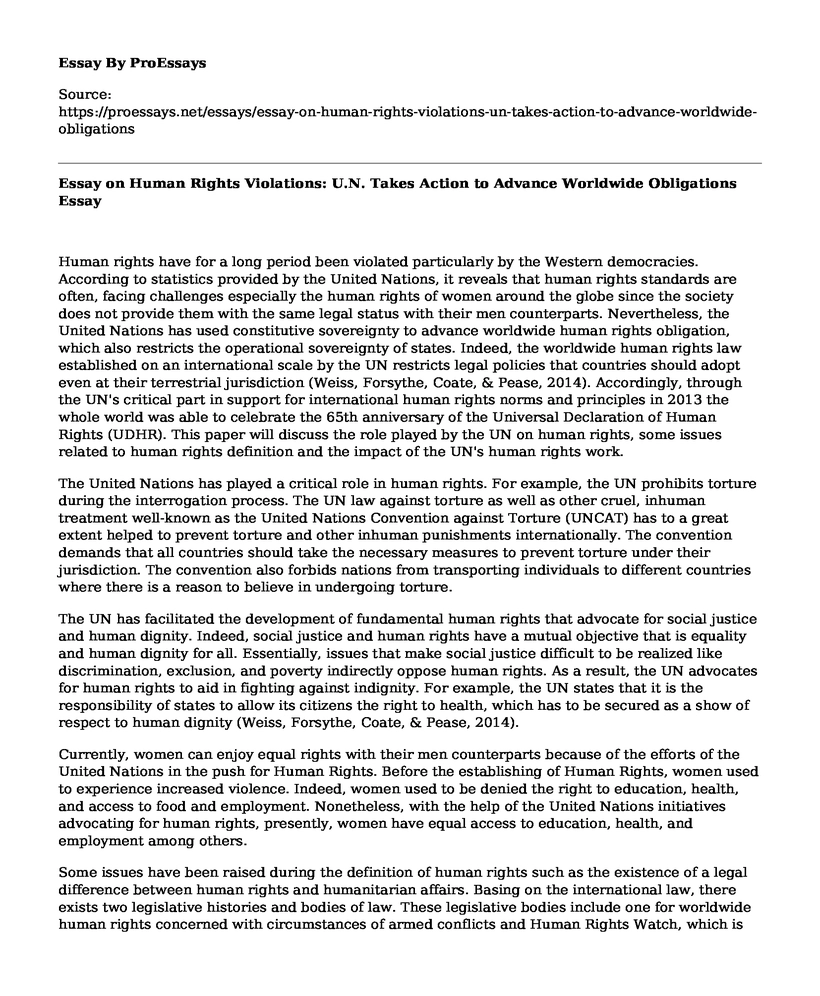Human rights have for a long period been violated particularly by the Western democracies. According to statistics provided by the United Nations, it reveals that human rights standards are often, facing challenges especially the human rights of women around the globe since the society does not provide them with the same legal status with their men counterparts. Nevertheless, the United Nations has used constitutive sovereignty to advance worldwide human rights obligation, which also restricts the operational sovereignty of states. Indeed, the worldwide human rights law established on an international scale by the UN restricts legal policies that countries should adopt even at their terrestrial jurisdiction (Weiss, Forsythe, Coate, & Pease, 2014). Accordingly, through the UN's critical part in support for international human rights norms and principles in 2013 the whole world was able to celebrate the 65th anniversary of the Universal Declaration of Human Rights (UDHR). This paper will discuss the role played by the UN on human rights, some issues related to human rights definition and the impact of the UN's human rights work.
The United Nations has played a critical role in human rights. For example, the UN prohibits torture during the interrogation process. The UN law against torture as well as other cruel, inhuman treatment well-known as the United Nations Convention against Torture (UNCAT) has to a great extent helped to prevent torture and other inhuman punishments internationally. The convention demands that all countries should take the necessary measures to prevent torture under their jurisdiction. The convention also forbids nations from transporting individuals to different countries where there is a reason to believe in undergoing torture.
The UN has facilitated the development of fundamental human rights that advocate for social justice and human dignity. Indeed, social justice and human rights have a mutual objective that is equality and human dignity for all. Essentially, issues that make social justice difficult to be realized like discrimination, exclusion, and poverty indirectly oppose human rights. As a result, the UN advocates for human rights to aid in fighting against indignity. For example, the UN states that it is the responsibility of states to allow its citizens the right to health, which has to be secured as a show of respect to human dignity (Weiss, Forsythe, Coate, & Pease, 2014).
Currently, women can enjoy equal rights with their men counterparts because of the efforts of the United Nations in the push for Human Rights. Before the establishing of Human Rights, women used to experience increased violence. Indeed, women used to be denied the right to education, health, and access to food and employment. Nonetheless, with the help of the United Nations initiatives advocating for human rights, presently, women have equal access to education, health, and employment among others.
Some issues have been raised during the definition of human rights such as the existence of a legal difference between human rights and humanitarian affairs. Basing on the international law, there exists two legislative histories and bodies of law. These legislative bodies include one for worldwide human rights concerned with circumstances of armed conflicts and Human Rights Watch, which is concerned with laws of war in relation with civilians and detained fighters in war (Weiss, Forsythe, Coate, & Pease, 2014). Similarly, there is also a clash between fundamental human rights and other legal rights that are vital but do not primarily essential. Consequently, the theoretical difference between fundamental rights and important rights has resulted in intense arguments such as
"is access to minimal health care fundamental hence a human right?" as a guaranteed by the Canadian government system or "why does the United States recognize a patient's legal right to sue a physician for negligence but does not allow the same individual to access to adequate health care as a human right?"
Also, philosophers demand to know the truth between "true" and "moral" human rights which are independent of the legal codification. However, in spite of the difference between the source of human rights, most of the societies have come to a consensus regarding the fundamental rights by including them in their constitutions and jurisdictions.
There are various impacts related to the UN's human rights. The UN diplomatic practice regarding human rights standards worldwide continuously keeps on expanding. Consequently, currently, significant percentages are still extending the international law dealing with human rights. Most of the states have accepted the UN's progress in advocating for human rights, which can be attested by the yearly celebration of the 2013 65th anniversary of the UDHR UN's key role in supporting global human rights norms and principles.
References
Weiss, T., Forsythe, D., Coate, R., & Pease, K. (2014). The United Nations, Human Rights and Humanitarian Affairs (pp. 161-184). Boulder, Colorado: Westview Press.
Cite this page
Essay on Human Rights Violations: U.N. Takes Action to Advance Worldwide Obligations. (2022, Dec 29). Retrieved from https://proessays.net/essays/essay-on-human-rights-violations-un-takes-action-to-advance-worldwide-obligations
If you are the original author of this essay and no longer wish to have it published on the ProEssays website, please click below to request its removal:
- Comparison Between the Ring of Gyges Story and John Stuart Mill: The Theme of Justice
- Essay Sample on IRS Scams and Tax Fraud
- Essay Sample on Harriet Tubman's Fight for Civil Rights: A Historical Perspective
- Essay Example on New York vs. Dallas: Comparing Crime Rates
- Essay on Privacy, Ethics, & Data Protection: Seeking & Sharing Sensitive Information
- Research Paper on The Hotbox: Solitary Confinement in the 19th Century
- Paper Example on Mass Shootings: US Witnesses Mounting Loss of Lives







